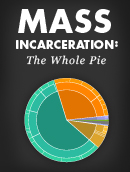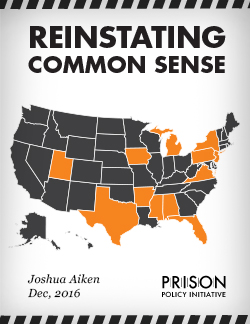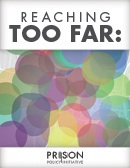Drug policy
How much of mass incarceration is a result of the war on drugs? Few questions about the justice system are more common — or harder to find clear answers to.
Only about 20% of incarcerated people — a small minority — are locked up for drug offenses. But the impact of the war on drugs can feel much larger. That's partly because police still make over 1 million drug arrests each year, only some of which lead to prison sentences. It's also because a lack of treatment and options often leads people to be incarcerated for drug-related crimes.
The complex connections between drugs and punishment don't end there. Below is some of our key research putting the war on drugs into perspective — and highlighting some of its worst policy failures:
Reports and campaigns
 Mass Incarceration: The Whole Pie 2024
Mass Incarceration: The Whole Pie 2024
Our report and data visualizations break down where people in the U.S. are incarcerated and why, including how many people are held in different facilities for drug offenses.
 Beyond the Count: A deep dive into state prison populations
Beyond the Count: A deep dive into state prison populations
Our analysis of rare survey date shows how mass incarceration has been used to warehouse people with marginalized identities and those struggling with poverty, substance use disorders, and housing insecurity, among other serious problems.
 Ending driver's license suspensions for drug offenses unrelated to driving
Ending driver's license suspensions for drug offenses unrelated to driving
A misguided policy from the War on Drugs suspends the driver's licenses of 175,000 people every year for drug offenses that do not involve driving. We're helping states repeal it.
 Combating racially imbalanced "sentencing enhancement zones"
Combating racially imbalanced "sentencing enhancement zones"
Increasing drug sentences in school zones is meant to protect children, but has worsened racial disparities in state prisons. We've published three reports about why these geography-based penalties are ineffective and harmful.
Briefings
- Oregon shouldn't go backwards on drug decriminalization, by Sarah Staudt, February 15, 2024
Oregon is in danger of repealing one of the most important criminal legal system reforms of recent years: here’s why the state should keep Measure 110 intact. - Addicted to punishment: Jails and prisons punish drug use far more than they treat it, by Emily Widra, January 30, 2024
Despite the common refrain that jails and prisons are "de facto treatment facilities," most prioritize punitive mail scanning policies and strict visitation rules that fail to prevent drugs from entering facilities while providing little to no access to treatment and healthcare. - Zombie politics: The return of failed criminal legal system policies in 2023 — and how to fight back, by Sarah Staudt, January 24, 2024
Unfortunately, 2023 saw many states double down on the war on drugs, implementing policies that would be more at home in 1993 than 2023. Here are some arguments to make if these zombie laws come to your state. - Seeking shelter from mass incarceration: Fighting criminalization with Housing First, by Brian Nam-Sonenstein, September 11, 2023
Providing unconditional housing with embedded services can reduce chronic homelessness, reduce incarceration, and improve quality of life – especially for people experiencing substance use disorder and mental illness. - Mortality, health, an poverty: the unmet needs of people on probation and parole, by Emily Widra and Alexi Jones, April 3, 2023
Unique survey data reveal that people under community supervision have high rates of substance use and mental health disorders and extremely limited access to healthcare, likely contributing to the high rates of mortality. - New data: Deaths in prison from drug and alcohol intoxication have grown dramatically since 2001, by Leah Wang and Wendy Sawyer, June 8, 2021
Drug and alcohol related deaths have increased by 611%. - Since you asked: What role does drug enforcement play in the rising incarceration of women?, by Tiana Herring, November 10, 2020
Women are being jailed at higher rates than ever. We explore whether drug arrests and substance abuse could be having an impact. - We know how to prevent opioid overdose deaths for people leaving prison. So why are prisons doing nothing?, by Maddy Troilo, December 7, 2018
Treatment programs offer promising results for recently incarcerated people, but prisons aren't using them. - Progress: With reforms in Iowa and Utah, 12,000 fewer people will be denied driver's licenses every year, by Aleks Kajstura, August 29, 2018
Two more states have opted to help safe drivers get their lives back on track after drug convictions. - DC ends driver's license suspensions for unrelated drug offenses, by Aleks Kajstura, March 23, 2018
D.C. will no longer suspend driver's licenses for drug offenses completely unrelated to driving, but 12 states still cling to failed law. - BJS report: Drug abuse and addiction at the root of 21% of crimes, by Wendy Sawyer, June 28, 2017
Responding to substance use with punishment rather than care is one of our worst criminal justice policy failures. - Seizing Chicago: Drug stings and asset forfeiture target the poor, by Alex Clark and Joshua Aiken, August 11, 2017
Instead of protecting Chicago's communities, state asset forfeiture practices and drug stings set up by federal agents target low-income, Black, and Latino residents, setting them up to fail. - Have we gone too far myth busting criminal justice reform? Drug policy is still important, by Bernadette Rabuy, May 23, 2016
We didn't get mass incarceration from War on Drugs alone, but drugs play an important role in less discussed stages of criminal justice systems. - Massachusetts removes major roadblock to re-entry: unnecessary license suspensions, by Alison Walsh, March 30, 2016
Massachusetts Governor Charlie Baker signed into law a bill to end license suspensions for people convicted of drug offenses unrelated to road safety, eliminating a major barrier toward successful re-entry.
Related issues
 Public health
Public health
The war on drugs is the most famous — but far from the only — criminal justice policy failure impacting public health. Our research sheds light on the public health effects of mass incarceration.
 Probation and parole
Probation and parole
What does the war on drugs have to do with probation and parole? Plenty — from unjust supervision terms imposed on people who commit drug offenses to people on supervision who are incarcerated for a failed drug test.
 Women and gender
Women and gender
Incarcerated women are more likely to be locked up for drug offenses — and more likely to suffer from substance use disorders — than men. Read more about incarcerated women and the injustices they face.
Research Library
Didn't find what you were looking for? We also curate a database of virtually all the empirical criminal justice research available online. See the section of our Research Library on drug policy.
 Mass Incarceration: The Whole Pie 2024
Mass Incarceration: The Whole Pie 2024 Ending driver's license suspensions for drug offenses unrelated to driving
Ending driver's license suspensions for drug offenses unrelated to driving Combating racially imbalanced "sentencing enhancement zones"
Combating racially imbalanced "sentencing enhancement zones" Public health
Public health Probation and parole
Probation and parole Women and gender
Women and gender


